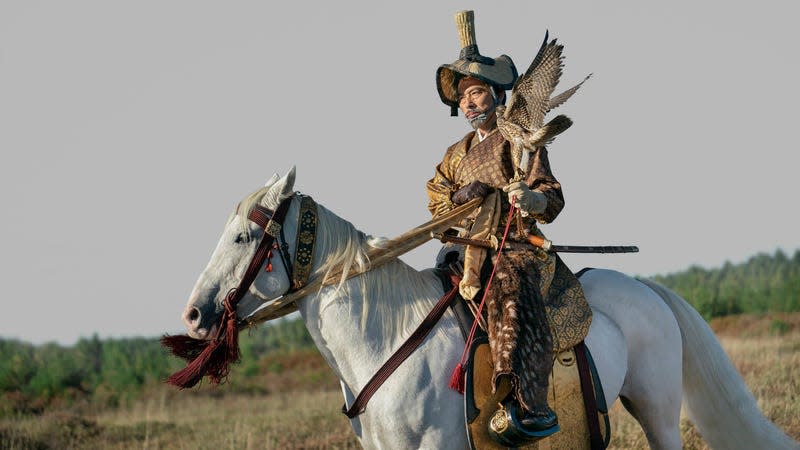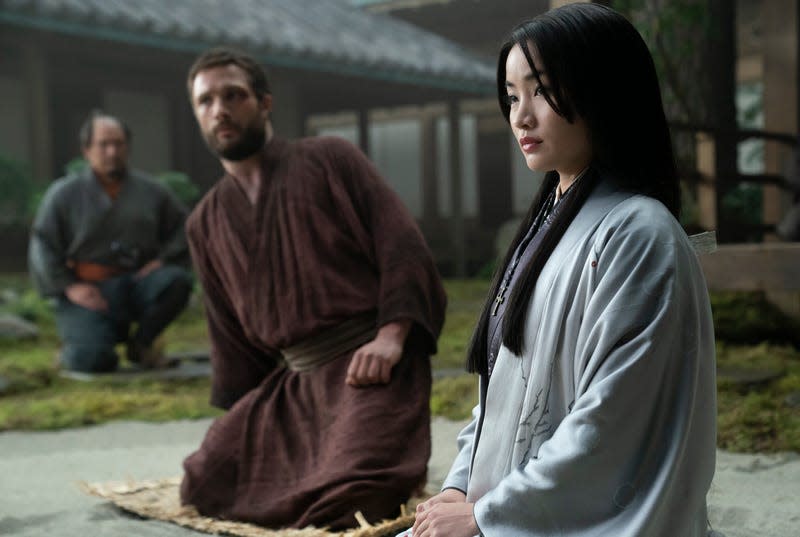Shōgun premiere: FX's historical drama kicks off with two brutal, skillfully woven episodes

- Oops!Something went wrong.Please try again later.
At long last, a full six years after this project was announced, two years since it wrapped filming, and a couple of weeks since its big Super Bowl ad, Shōgun has finally made it to our screens with a generous two-episode premiere. Based on James Clavell’s Shōgun, his 1975 tome of a dad book (not to diminish it—it’s apparently really good), and following the Richard Chamberlain-led NBC miniseries that aired in 1980, this new version of the classic tale boasts a cast of high caliber Japanese actors actually speaking Japanese. With one of these actors (the great Hiroyuki Sanada, who captivates as Lord Yoshii Toranaga) serving as a producer on the show, Clavell’s daughter Michaela signing on as an executive producer, and a seemingly massive budget to get the historical and cultural details right, authenticity is the name of the game. And it shows.
Now, watching historical dramas can require a good bit of context, and let’s face it: Americans like myself aren’t always that well educated on the political histories of other places. But don’t worry, guys! I did a bunch of homework. (Basically, I watched this video, read things like this, and searched things when I was like, “What’s a fief?” I’ll keep doing it, too—just for you! And in an effort to respect the culture, of course.) Anyway, this is how I understand it: Prior to 1600, Japan had gone through centuries of being ruled by a big boy emperor/Imperial Court; then feudal lords popped up as outlying regions became more prosperous, defended by samurai whose power grew to threaten the emperor’s, and they essentially all fought each other all the time. The shōgun, the sovereign leader for which this show is named, rose to power following (what else?) a big samurai insurrection, and things were peaceful for a while until another hundreds of years of turmoil erupted. In 1590, the taikō came to power, ushering in about a ten-year period of peace before he died, leaving behind a little-boy heir, and a mandate to create a Council of Regents (or bōsho). That’s when our Shōgun kicks off.

"Anjin," "Servants of Two Masters"
A-
A-
"Anjin," "Servants of Two Masters"
SEASON
1
EPISODES
1, 2
And it actually opens with the main white dude of the show, Englishman John Blackthorne, doing his job as a pilot on a Dutch trading ship coasting on a shadowy sea. (He’s the guy who got most of the attention in Shōgun’s previous TV adaptation.) This voyage has been bad news for his captain and the crew. Blackthorne remains optimistic that they’ll soon reach Japan, a land they’ve all heard about but haven’t found, but his captain has lost all hope. He reminds Blackthorne that they have gone from five ships and a crew of 500 down to one ship. A lot of their crewmates have starved to death. And the captain himself actually ends his own life shortly after the two of them have this conversation. They reach land, where samurai approach and search the vessel, with dead guys all over the deck. And that’s when the warriors find their treasures, weapons, some other nearly dead guys, and a riled up, fight-ready Blackthorne who jumps at them. They’re immediately suspicious and lock him, and his friends, away.
Meanwhile, none of these five bōsho guys like each other. The guy the group majority hates the most, though, is Lord Toranaga. They’ve gathered everyone together at Osaka Castle, because they think he’s up to some sneaky shit. Not only has his fief doubled recently, but the taikō’s widow Lady Ochiba has gone to Toranaga’s castle at Edo, and they think he has taken her hostage as a flex. He claims she’s only there to help deliver his grandchild, as her sister is the one giving birth, but they don’t buy it and decide to hold him captive. And they suggest they’ll probably vote to kill him in a little while. These first two episodes sort of lead with exposition like this—they have to—but it comes more through the lens of character. It’s subtle, skillfully woven into the show’s silky fabric.
Since it’s exposition time, here’s a little more: Blackthorne is European Protestant, so guess who he hates? The Catholics. And Catholics from Spain and Portugal—the Portuguese in particular—have established a serious presence in Japan at this time, so much so that they haven’t even told their Japanese hosts that other Europeans exist. This was before the late nineteenth century when Japan engaged in its own colonial projects. They had a good thing going where they were, they thought. Why would they care that much about these weirdos who showed up?

Well, Blackthorne quickly exposes his Portuguese enemies’ odd dealings as soon as he has an audience with Toranaga, who’s scrambling to shore up power so that his frenemies don’t kill him. And boy does Toranaga hate to hear that his country supposedly “belongs” to Portugal. So why does Blackthorne have an audience with this hot shot lord anyway? Because Toranaga sees that he’s the Catholics’ enemy (two of the other Regents/bōshos are Catholics) and he recognizes the potential to use the Englishman as a political pawn. Toranaga sees potential, too, in Toda Mariko, a Catholic woman who has studied Portuguese since converting, to serve as a translator so that he can communicate more directly with Blackthorne, without the priests interfering in their affairs. By the end of these two episodes, Blackthorne, Mariko, and Toranaga have cemented their arrangement. Together, they’re gonna take down the other Regents—and maybe some shady priests, too.
So there’s plenty of intrigue and potential for backstabby drama here, and as I mentioned earlier, the period accurate details are rich. The landscapes—from lush forest to dank and dirty jail cells to the great wooden palace with its central karesansui garden—are a sensory feast. The acting is awesome. But tender-hearted friends, let me warn you: It gets gory. The violence in Shōgun is staggered, but when it shows up, it’s staggering. Men with katanas slice heads clean off, characters go on throat slashing sprees, arrows pierce through people in the woods, a guy gets boiled alive. Close your eyes sometimes if you must, but let’s all keep watching. This is good stuff.
Stray observations
It’s kind of an important thing and it took me longer than I care to admit to catch onto this: When Blackthorne is speaking to his shipmates, he’s definitely speaking English English, but when he’s speaking “English” to anyone in Japan, it’s meant to be Portuguese. Just think of it as dubbed Portuguese, but without that annoying dubbed quality, and you’ll be fine.
The translation stuff is interesting in general: the way this show illustrates the realities of a language barrier, the characters each calling each other their equivalent of “savage,” the layers of deception that can stem from relying on a person (perhaps of questionable character) to translate. It makes things twistier and it highlights cultural differences in a clear way.
This Blackthorne guy is pretty hot by certain Western standards, kind of a rugged, singer-songwriter vibe (turns out Cosmo Jarvis is one). So it’s interesting to see the Japanese samurai and nobles he encounters so grossed out by his appearance, calling him a dog all the time. Poor, hairy guy!
Also, I like Jarvis’ voice in this. I’ve seen it compared to Tom Hardy, and it is a bit Bane-like, but with a hint of Daniel Plainview.
Isn’t it wild to imagine not even knowing another place exists in today’s globalized world? The Portuguese really could be liars like that and lie, through omission, that they’re the only Europeans out there. Wild.
The last scene of episode two highlights a cultural difference in hygiene at the time (and probably now, too). When Lady Mariko tells Blackthorne that servants are preparing a bath for him, he responds, horrified, “Two baths in a week. What, do you want me to catch the flux?” (That’s dysentery. I looked it up.)
That scene also gives us a moment I rather like. Blackthorne tells Mariko, “Your lord is in danger. And I have a ship.” He wants her to sail away with him, eh? Her calm, measured response is that he should watch his tongue...and call her “Mariko Sama” from now on. Yeah! Show her some respect.
Also, Mariko’s husband seems like a huge butthole. When she jokes with her own kid, he says, “You laugh with our son like he’s a lady of the court.” Seems clear she doesn’t laugh with this guy...ever.

